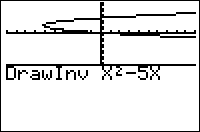TI-BASIC:Drawinv: Difference between revisions
Initial automated import |
Automated superscript correction |
||
| Line 12: | Line 12: | ||
The DrawInv command draws the inverse of a curve in terms of X. Its single argument is an expression in terms of X. | The DrawInv command draws the inverse of a curve in terms of X. Its single argument is an expression in terms of X. | ||
For example, DrawInv X | For example, DrawInv X<sup>2</sup> will draw the inverse of the equation Y=X<sup>2</sup>. The inverse reverses the variables X and Y, so that the curve X=Y<sup>2</sup> will be graphed. | ||
You can also think of this as graphing the expression but with X representing the vertical direction, and Y representing the horizontal. | You can also think of this as graphing the expression but with X representing the vertical direction, and Y representing the horizontal. | ||
Latest revision as of 22:22, 24 February 2016
Command Summary
Draws the inverse of a curve in terms of X.
Command Syntax
DrawInv curve
Menu Location
Press:
- 2nd DRAW to access the draw menu.
- 8 to select DrawInv, or use arrows and ENTER.
TI-83/84/+/SE
1 byte
The DrawInv command draws the inverse of a curve in terms of X. Its single argument is an expression in terms of X.
For example, DrawInv X2 will draw the inverse of the equation Y=X2. The inverse reverses the variables X and Y, so that the curve X=Y2 will be graphed.
You can also think of this as graphing the expression but with X representing the vertical direction, and Y representing the horizontal.
DrawInv requires the calculator to be in Func mode, and is affected by the Connected/Dot setting.
Advanced Uses
DrawInv will update X and Y for each coordinate drawn (like DrawF and Tangent(), and exit with the last coordinate still stored.
When evaluating the expression using DrawInv, the calculator will ignore the following errors: ERR:DATA TYPE, ERR:DIVIDE BY 0, ERR:DOMAIN, ERR:INCREMENT, ERR:NONREAL ANS, ERR:OVERFLOW, and ERR:SINGULAR MAT. If one of these errors occurs, the data point will be omitted.
For this reason, DrawInv can sometimes behave in an unexpected fashion: for example, it doesn't throw an error for list or matrix expressions (it won't graph anything, either).
